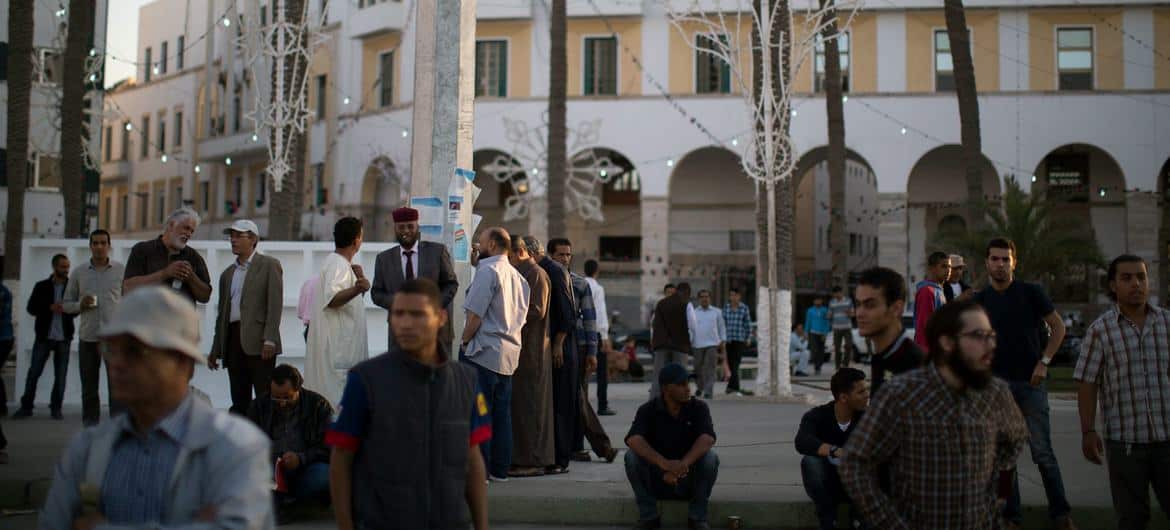United Nations - Clashes erupted in several neighbourhoods of the Libyan capital earlier this week, reportedly sparked by the killing of a prominent militia leader. The fighting, which involved heavy weapons in densely populated areas, forced hundreds of families to flee and put a significant strain on local hospitals.
UN Secretary-General António Guterres called on all parties to take urgent steps to consolidate the ceasefire announced on Wednesday. "The rapid nature of the escalation, which drew armed groups from outside and exposed densely populated neighbourhoods to heavy artillery fire, was alarming," his spokesman said in a statement on Thursday. "The Secretary-General reminds all parties of their obligation to protect civilians and calls on them to engage in good faith in a serious dialogue to address the root causes of the conflict."
Raising the alarm
The United Nations Support Mission in Libya (UNSMIL) issued successive warnings throughout the week, describing the situation as "deeply worrying" and calling for an "immediate and unconditional ceasefire". "Attacking and damaging civilian infrastructure, physically harming civilians and endangering the lives and safety of the population may constitute crimes under international law," the mission said Wednesday, praising the mediation efforts of elders and civil society leaders.
Years of fragmentation
Nearly 15 years after the fall of Muammar Gaddafi and the formation of rival governments in 2014, the country remains divided, with the internationally recognised Government of National Unity (GNU) based in Tripoli in the north-west and the Government of National Stability (GNS) in Benghazi in the east. The situation is further complicated by competition over Libya's vast oil wealth. Although the country produces more than a million barrels a day, the living conditions of ordinary Libyans have improved little.
Accountability for atrocities
The prosecutor of the International Criminal Court (ICC) announced in New York on Thursday that the investigation into alleged war crimes in Libya has entered a new phase after authorities there began to cooperate more. ICC prosecutor Karim Khan, briefing the UN Security Council from The Hague, described the "unprecedented six-month momentum", citing the January arrest of Osama Elmasry Najim, commander of the now-disbanded Special Deterrence Force (SDF), and his controversial return to Libya.
Mr. Khan briefed the ambassador via video link after the United States imposed criminal sanctions on the court, including executives, threatening the prosecutor and others with arrest if they travel to the United States. The US issued the order in response to the ICC issuing an arrest warrant for Israel's prime minister and former defence minister last November. Mr Najim was arrested by Italian authorities on an ICC warrant on charges of war crimes and crimes against humanity in connection with abuses at Metiga prison. But his return has caused deep concern, Mr Kha said.
The new "rule of law" promises accountability
"There was genuine dismay and disappointment among the victims that Mr Njeem had returned to the scene of the alleged crimes," Mr Khan said. Despite this setback, he said the arrest warrant had caused "shock" among Libyan militias and alleged perpetrators in Libya and signalled a growing awareness that "the rule of law has entered Libyan territory". He confirmed that further arrest warrants were in the works and that the ICC had responded to a request for assistance from the UK's National Crime Agency in its own investigation into Mr Njeem. "There is a black box of suffering in Libya," he told the ambassadors. "We will succeed in breaking it."
Libya grants ICC jurisdiction
In another significant development, Libya has formally submitted a declaration to the International Criminal Court under Article 12(3) of the Rome Statute, granting the Court jurisdiction over crimes committed on Libyan territory between 2011 and 2027. Mr. Khan described this as a "new chapter" in efforts to establish accountability and confirmed that the investigation phase should conclude in early 2026.
About the International Criminal Court
The International Criminal Court (ICC) is an independent judicial body established under the Rome Statute, adopted in 1998 and in force since 2002. Although the ICC is not part of the United Nations, it works closely with it in a cooperative manner. The situation in Libya was first referred to the ICC by the UN Security Council in 2011 through Resolution 1970.
un.org/gnews.cz-jav



